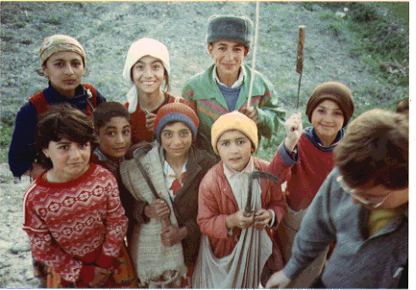Vance's CALL resources page | esl_home index
Return to Papyrus News Archive Main Page
![]()
Vance's CALL
resources page |
esl_home
index
Return to Papyrus News Archive Main
Page
| October 28, 2001: This message was distributed by Papyrus News. Feel free to forward this message to others, preferably with this introduction. For info on Papyrus News, including how to (un)subscribe or access archives, see <http://www.gse.uci.edu/markw/papyrus-news.html>. |
I finally got around to looking for my pictures from Uzbekistan. Didn't find much, except this one photo of some kids. Since it's too much trouble to put it up on the Web, I'm attaching it here. Fortunately, it's not too big (52k).

I visited Uzbekistan and Kazakhstan in 1992 during the year I spent working in Moscow. The Soviet Union had just broken up when I went there, so I suppose I was one of the first visitors to them as independent countries. They were quite different from each other. Kazakhstan had a much more Mongolian feel to it, in terms of food, weather, people, culture, whereas Uzbekistan was much more Middle Eastern.
Almaty (then called Alma Ata), the capital of Kazakhstan, was remarkably attractive. It's, to my knowledge, the greenest city in the world, absolutely filled with trees and leaves and plants and greenery. It was also unfortunately rather cold, at least during my visit. I arrived on May 1 and it was snowing! It was also a wonderfully Eurasian city, with the population equally divided between Kazakhs on the one hand and Europeans (Russians and Ukrainians) on the other hand. There was a bit of inter-marriage, but not a lot.
I stayed with a family of a teacher I had met in Moscow. Her father was especially interesting. A very tall and dignified 80-year-old Kazakh man who had been an important political leader in the area for decades (including being responsible for the production and provision of goods from Kazakhstan for the war effort during World War II, which I'm sure was no small contribution toward the defeat of the Nazis!). He had first gone to Moscow as an illiterate youth shortly after the Russian revolution, and the communists helped give him an education for which he was ever appreciative.
Actually, a rather strange thing about what was often referred to as "Soviet imperialism" in Central Asia was that much more wealth traveled TO the periphery than FROM the periphery. Early in the century, the Central Asian countries were as poor as Afghanistan, but after Soviet power they experienced tremendous development from the 1920s to the 1990s. When I visited Kazakhstan and Uzbekistan (admittedly the two richest of the Central Asian republics) in 1992, it seemed to me that the standard of living was not that far behind that of Moscow (and lightyears ahead of Afghanistan).
Another fascinating element of Kazakhstan was just being so far removed--not only geographically but also culturally and politically--from the United States. It's an area of the world where, at that time, you could meet people who spoke 5-6 languages, but not a word of English. Kazakhstan is very close to the Chinese province of Xinjiang, and I met some people from a visiting delegation from there. They were Uygurs, a minority group in China that is close in language and appearance to the Kazakh people. I spent some time with a young Xinjiang woman who did not appear "Chinese" at all, but Chinese was the only language we had in common, so that's what we spoke (which, as you might imagine, limited the conversation quite a bit, given the state of my Chinese). It was an incredibly exotic feeling, to be off in this distant corner of the world in this super-green half-European/half-Asian city speaking Chinese to a non-Chinese (well, non-Han) person from China.
Another adventure in Kazakhstan--my first, and last, time to eat horsemeat :-) --which, at least at that time, was considered a treat there.
On to Uzbekistan. I visited the capital of the republic, Tashkent, and two of the oldest cities in the world, Samarkand and Bukhara, both of which were on the old silk road between China and Europe. It was much drier, and fortunately warmer, in Uzbekistan, and the sashliki (how to translate?) were delicious. Samarkand and Bukhara were filled with gorgeous mosques thousands of years old, as well as typical Middle Eastern bazaars. The percentage of Europeans was much lower in Uzbekistan than in Kazakhstan, though there was quite a large number in the capital, Tashkent (including a lot of Jews, many of whom have since emigrated to Israel). In addition to the European Jews in Tashkent, there were also a small indigenous Jewish community in the Bukhara area who had lived there for thousands of years.
Uzbekistan, like Kazakhstan, was doing pretty well economically then, though I'm sure that both have suffered a lot in the last 10 years, as has most of the former Soviet Union. Both provinces were, and are, strongly secular. Uzbekistan has had a lot of problems the last few years from an Islamist terrorist group associated with Bin Laden (and the government apparently hasn't helped matters with its own repressive acts, at least according to news reports). These are the countries that are most threatened by the Bin Laden forces--not the United States, but countries such as Uzbekistan, Indonesia, and many other Muslim-majority countries (and regions, i.e., the Mindanao area in the Philippines) where possibilities for economic and social progress are being sabotaged through terroristic attacks on modernity, secularism, and religious pluralism.
Anyway, I remember very fondly my visit to the region. I hope that better times await it soon.
Mark Warschauer
![]()
Use
the navigator at the top of this page or your
browser's BACK button to return to a previous page
For comments, suggestions, or further information on this site, contact Vance Stevens, webmaster. Regarding content of Papyrus-News, contact Mark Warschauer.